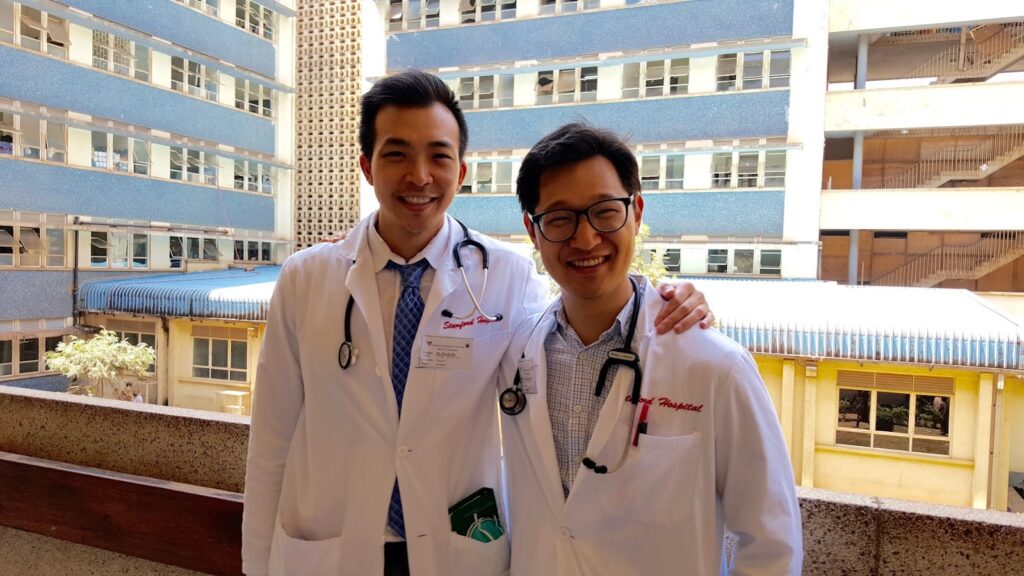Published: 08/16/2023
A global health physician explores the many ways that climate change affects the heart
By Jamie Hansen, Global Health Communications Manager

Cardiologist Andrew Chang, MD, spent years investigating tropical cardiovascular illnesses such as rheumatic heart disease – a widespread but under-recognized global health issue he passionately believes merits further research and attention.
But in 2020, several circumstances converged to direct Chang’s research to a much broader question, also rooted in health equity concerns: how does climate change, along with other environmental factors, affect the heart?
Chang had just begun a PhD program in epidemiology at Stanford. He wanted to investigate a heart challenge that impacted a larger population and would require more complex quantitative methodologies to understand. Simultaneously, the pandemic and a devastating wildfire season settled on the Bay Area, forcing shutdowns and choking the air with unhealthy smoke. Chang was a new father at the time.
“It looked like Blade Runner every day,” he recalled. “I remember sitting in our house in San Mateo with my newborn, all the air conditioners and air filters going 24-7, just wondering when all this was going to end and what it would mean for my kid to grow up in this kind of world.”
He’d been worrying about climate change for some time, but hadn’t been sure how to engage professionally with the issue.
“Sitting there, I realized this was something I could focus on: understanding the environmental determinants of heart health,” he said.

An investigation with real-world impact
Not long after, Chang seized an opportunity to apply his research for real-world impact. Stanford planetary health researchers Kari Nadeau and Marshall Burke had agreed to assess the health consequences of the 2019 Kincade Wildfire, which caused mass destruction and evacuations in Sonoma County, Ca, to inform the county district attorney’s lawsuit against PG&E. Nadeau needed an epidemiologist interested in climate change-related research, and Chang, along with his advisor, Michelle Odden, PhD, volunteered.
His task was to describe the scale of the fire’s impact on the health of Sonoma County residents, based on emergency room visits during the time of the fire. To do so, he analyzed data on all emergency room visits in California, maintained by the state. Chang and colleagues found a 30 percent increase in ER visits for lung-related problems during the time of the wildfire. For heart-related disorders, they were surprised to find that visits decreased during the fire.
Chang and his colleagues have studied the data to understand why this might be, and noted that overall ER use goes down during a wildfire. They believe that wildfires may prompt a shift in ER use for issues perceived to be less urgent, such as nonspecific chest pain.
“If you’re having an asthma attack, you can’t breathe, so you go to the ER,” he said. “But for someone with mild chest pain who might normally go in to get it checked out, we’re wondering whether during a fire they might choose to stay home and wait it out.”
PG&E ultimately settled for $20.25 million in payments to local institutions and five years of District Attorney oversight of the utility’s local wildfire prevention initiatives. For Chang, contributing to the case was immensely rewarding.
“In research, you don’t always see your work translated into meaningful impact,” he said. “So this was a really cool experience – one that I’ll probably remember forever.”
The experience deepened Chang’s commitment to understanding the myriad ways the heart is impacted by changing environmental conditions, including air pollution and heat.
Heat and the heart
Chang is now investigating the interaction between certain heart medications and heat-related collapse in elderly people.
“The impacts of extreme heat are a cardiovascular issue – especially for aging adults – because of how the body responds to high temperatures,” he said.
The impacts of extreme heat are a cardiovascular issue – especially for aging adults – because of how the body responds to high temperatures.
Andrew Chang
Older adults are more vulnerable to heat for many reasons, he said. They are more likely to have heart disease that weakens the heart, they sweat less, and they may take medications that cause dehydration or limit the heart’s ability to assist the body in cooling itself.
“The cardiovascular system takes the brunt when the body realizes it’s overheated,” he said. “This really takes a toll on the heart because the engine is now being cranked up to facilitate this effort. This is especially tough for people with pre-existing heart disease.”
Chang and his mentor at the Stanford Cardiovascular Institute, Michelle Odden, are analyzing records for nursing home residents in the VA system to understand whether those who collapse from heart-related problems during heat events are likely to be on multiple heart medications.
“For our older patients, this could be an argument for reducing or consolidating medications during heat events to reduce their risk of circulatory collapse,” he said.
Air pollution and heart health
Air pollution’s impacts on the heart can be more insidious and harder to understand than heat’s, Chang said. “We know air pollution is bad for the heart. But because most air pollution causes a low exposure over a long period of time, the effects can be pretty subtle and hard to pick up,” he said.
For his epidemiology dissertation, Chang is again collaborating with Odden on an investigation into how air pollution impacts heart health over years or decades of exposure.
He’s been analyzing a half decade of data from the longitudinal Cardiovascular Health Study to look for subtle, pre-clinical changes taking place in individuals’ hearts – and then comparing those changes with air pollution data from the same time period.
“We’re looking for an early detection system of sorts – subtle changes in the way the heart muscle moves that have been linked to future heart muscle disease and things like heart failure,” he said.
While their findings are still under review, their initial analysis suggests that low-level exposure to air pollution over long periods of time indeed is associated with subtle dysfunction in the way the heart muscle contracts.
This signals a significant health equity concern, Chang said.
“Communities of color or medically underserved populations are already at baseline higher risk of heart disease, and they also tend to be at greater risk for air pollution because of where they live and a lack of access to air conditioners or other modes of air filtration” he said. “Climate change is likely to exacerbate disparities in heart diseases caused by environmental factors.”
Climate change is likely to exacerbate disparities in heart diseases caused by environmental factors.
Andrew Chang
Informing adaptations to protect the heart
Recalling the 2020 wildfires that cast heavy smoke over the Bay Area, Chang remembers feeling ill equipped to help patients who worried about what those darkened skies meant for their health.
Chang hopes his research can help inform adaptations that are critical to protecting human health in light of climate change. This includes understanding who is most vulnerable and how to help them, including making adjustments to medications and physical environments.
“We’re spending a lot of time researching and talking about the impacts of climate change and how to stop it, but at this point, we know climate change is here, and it’s already affecting people’s lives and health,” he said. “We need to shift our focus to adaptation.”

